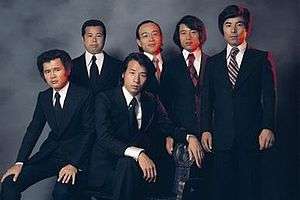Hiroshi Uchiyamada and Cool Five
Hiroshi Uchiyamada is redirected here. The article is written about the band led by a musician named Hiroshi Uchiyamada. For the imaginary person on the Japanese manga "Great Teacher Onizuka", see List of Great Teacher Onizuka characters.
| Hiroshi Uchiyamada and Cool Five | |
|---|---|
 | |
| Background information | |
| Also known as |
Kiyoshi Maekawa and Cool Five Cool Five |
| Origin | Japan |
| Genres | Kayōkyoku, enka, pop |
| Years active |
1967–1990s 2006–present |
| Labels |
Victor Entertainment BMG Japan |
| Members |
Kiyoshi Maekawa Etsuro Miyamoto Masaki Kobayashi Masashi Osawa Ryoma Nishida Tetsuya Yamagami |
| Past members |
Hiroshi Uchiyamada Takayuki Miyauchi Shigemi Iwaki Shigeru Morimoto |
Hiroshi Uchiyamada and Cool Five (内山田洋とクール・ファイブ Uchiyamada Hiroshi to Kūru Faibu) are a Japanese kayōkyoku group, formed by the late Hiroshi Uchiyamada (born Michio Uchiyamada, 1936–2006) in 1967 and fronted by the lead vocalist Kiyoshi Maekawa.
In 1969, the group debuted with the 11th Japan Record Award-winning song "Nagasaki wa Kyou mo Ame datta".[1] They enjoyed a highly successful career mainly during the first half of the 1970s, producing numerous hit singles including "Awazu ni Aishite", "Uwasa no Onna","Soshite, Kōbe", "Nakanoshima Blues" and "Tokyo Sabaku". They lost popularity after the departure of their frontman in the late 1980s, and their career went into hiatus after the band lineup was radically altered around the 1990s.
After the band's founder died of lung cancer in 2006, the remaining members, including Maekawa, reunited.[2][3]
Band members
| 1967–1987 |
|
|---|---|
Discography
Charting singles on the Japanese Oricon
| Year | Single | Chart positions |
|---|---|---|
| JP [4] | ||
| 1969 | "Nagasaki wa Kyō mo Ame Datta (長崎は今日も雨だった)" | 2 |
| "Wakare Ame (わかれ雨)" | 32 | |
| "Awazu ni Aishite (逢わずに愛して)" | 1 | |
| 1970 | "Ai no Tabiji wo (愛の旅路を)" | 4 |
| "Uwasa no Onna (噂の女)" | 2 | |
| "Ai no Itazura (愛のいたずら)" | 10 | |
| 1971 | "Subete wo Aishite (すべてを愛して)" | 24 |
| "Onna no Iji (女の意地)" | 43 | |
| "Onna no Kuyashisa (女のくやしさ)" | 26 | |
| "Minato no Wakareuta (港の別れ唄)" | 11 | |
| "Hiren (悲恋)" | 22 | |
| 1972 | "Kono Ai ni Ikite (この愛に生きて)" | 7 |
| "Koiuta (恋唄)" | 14 | |
| "Soshite, Kōbe (そして、神戸)" | 6 | |
| 1973 | "Otokonaki (男泣き)" | 14 |
| "Shussen (出船)" | 15 | |
| "Umidori no Naku Hi ni (海鳥の鳴く日に)" | 24 | |
| "Kokorogawari (心がわり)" | 32 | |
| 1974 | "Ame no Shinobiai (雨のしのび逢い)" | 41 |
| "Banka (晩夏)" | 64 | |
| "Uminari (海鳴り)" | 45 | |
| 1975 | "Uwasa (うわさ)" | 41 |
| "Kita Hotel (北ホテル Kita Hoteru)" | 31 | |
| "Nakanoshima Blues (中の島ブルース Nakanoshima Brūsu)" | 9 | |
| "Futari no Midousuji (二人の御堂筋)" | 44 | |
| 1976 | "Kimagure Ame (気まぐれ雨)" | 40 |
| "Tokyo Sabaku (東京砂漠)" | 19 | |
| "Onna no Kawa (女の河)" | 53 | |
| 1977 | "Saikai Blues (西海ブルース Nakanoshima Brūsu)" | 20 |
| "Futari no Kaikyou (二人の海峡)" | 57 | |
| "Omoikiri Bashi (思いきり橋)" | 45 | |
| "Minato no Wasuregusa (港の忘れ草)" | 76 | |
| 1978 | "Ai no Tobira (愛の扉)" | 91 |
| "Sayounara no Kanata e (さようならの彼方へ)" | 56 | |
| "Mukashi ga Arukara (昔があるから)" | 91 | |
| 1979 | "Akirame Waltz (あきらめワルツ Akirame Warutsu)" | 83 |
| 1980 | "Last Song" | 87 |
| "Miwaku Shape Up (魅惑・シェイプアップ Miwaku Sheipu Appu)" | 93 | |
| 1984 | "Koi Saguri Yume Saguri (恋さぐり 夢さぐり)" | 58 |
- The group released over 50 singles until Kiyoshi Maekawa left the band in 1987, and those sales have been estimated more than 5.9 million copies.
References
- ↑ "List of the 11th Japan Record Award Winners" (in Japanese). Retrieved 2008-11-14.
- ↑ "Hiroshi Uchiyamada, aged 70, a leader of the Cool Five dies of lung cancer". zakzak.co.jp (in Japanese). Sankei Shimbun Company, Limited. Retrieved 2008-12-08.
- ↑ "Kiyoshi Maekawa with the Cool Five reunion". daily.co.jp (in Japanese). Daily Sports. Retrieved 2008-11-14.
- ↑ Yamachan Land (Japan's charts archives) - Singles Chart Daijiten - "Hiroshi Uchiyamada and Cool Five Oricon Singles Hot 100 Chart Listings" Check
|url=value (help). Retrieved 2008-12-13.